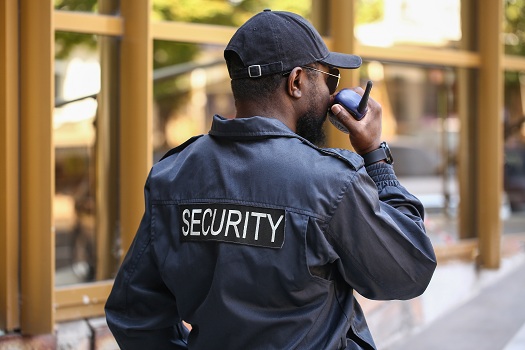Baltimore Security act as a visible deterrent, and if a crime does occur, they’re first responders until law enforcement arrives. Their training prepares them to react quickly and efficiently in emergency situations.
Security guards need strong communication skills to relay instructions, de-escalate situations, and write reports. Try out EdApp’s free communication training courses to strengthen your team’s abilities.

Security guards are often responsible for monitoring and ensuring the safety of people and property in an area. They must be observant and have the ability to pick up on subtle cues that something is wrong. This includes noticing changes in behavior, such as becoming nervous or using derogatory language. It also means being able to notice things like broken windows or smoke coming from an area. Security guards must be able to respond quickly to these signs and take the appropriate action.
Security officers must be able to recall information about the people and vehicles in their areas of responsibility for incident reporting purposes. This requires a clear memory and the ability to write down observations without reflecting any bias. Security officers also need to be able to accurately record what they see on their patrols so that other staff members who might be responding to the situation can take the correct action.
A security guard’s job is a lot more dangerous than most other jobs, so they need to be able to maintain a high level of alertness. This means that they should not fall asleep on duty, leave their post without permission or neglect their duties in any way. Security guards must always be aware of their surroundings and perform an ocular patdown of anyone in their sight line. They must also have a keen sense of sight, hearing and smell to aid in their vigilance.
It is important that a security guard is able to vary the route they take to their checkpoints throughout the day to make it difficult for criminals to plan an attack against them. Guards should also consider using a voice recorder to capture important details of the people and vehicles in their area and be able to use it for future reference if needed.
Security guards should always be able to distinguish between suspicious activity and the normal activities of the people they are working with or around. This is especially true when they are dealing with people who may not speak English very well. Security guards should also be able to recognize when their instincts tell them that a situation is not safe and should call the authorities immediately. For example, a security guard may notice a man falling into the water and realize that he is in danger of drowning. In this case, the security guard should contact the police right away so that he can save the man’s life.
Communication Skills
In security work, effective communication skills are necessary to build and maintain relationships with clients and colleagues. In addition, they play a vital role in maintaining the safety of the people and property that guards protect. Security guards must be able to communicate clearly, concisely and in a calm manner when relaying information or instructions to staff or the public. This includes verbal communication, such as enunciating clearly and accurately, and non-verbal communications, such as body language, facial expressions and proxemics. It’s also important for a security guard to have proficient written communication skills, as they may need to document incidents and communicate with other employees or management via written reports.
In the case of an emergency, a security guard must be able to communicate quickly and clearly with others on-site or via their two-way radios. This ensures that everyone knows what’s happening, where to go and what procedures to follow. This is particularly crucial in situations where a security guard needs to relay information to law enforcement officers or emergency services personnel.
A security guard’s communication skills can also help them defuse a situation with the public by being empathic and understanding the feelings of those involved. They can then find a resolution to the conflict that works for all parties involved. This is accomplished through effective listening and actively reflecting back what they’ve heard. This also means avoiding distractions and interruptions while the speaker is talking.
Security guards are often called upon to interact with a variety of people, including contractors, customers and owners. This requires strong interpersonal skills that include being able to adapt to different personalities and cultures. A security guard with poor interpersonal skills can be easily overwhelmed by the stress of their job. This can lead to an inability to remain calm and make rational decisions in high-pressure situations, such as dealing with an agitated member of the public.
A security guard’s ability to defuse a situation can be enhanced through their physical fitness and by practising self-care and mindfulness, such as getting enough sleep, eating well and exercising regularly. They can also develop and practise strategies for remaining calm in stressful situations, such as using de-escalation techniques, taking a time out, and focusing on their breathing.
Decision-Making Skills
Security guards often have to take command of an emergency situation, so they need strong decision-making skills. They need to know when to be assertive and act on their own, but also when they should follow directions from their superiors or law enforcement. They must have a good understanding of what security procedures are in place at their location, and they should be familiar with the people and areas that need protection.
A security guard should have great customer service skills as well. They may be responsible for greeting guests or visitors, or they might help them locate a room or an employee. They need to be able to speak clearly and politely on the phone, as well as in person. Depending on the nature of their work, they may also need to write detailed reports and respond to inquiries from clients or other law enforcement officials.
The ability to quickly assess a situation and make logical decisions is called critical thinking. Security guards who have these skills can analyze new information objectively and find ways to defuse tense situations. They can also determine if a threat is real or not, and they can use this information to plan patrol routes or prepare emergency response strategies.
It’s important for a security guard to have the ability to be flexible and adapt to changing circumstances. They might have to change their patrol route due to a construction project or adjust the way they check in employees. Security guards who can adapt to these changes will be able to keep their customers and colleagues safe, even when things go wrong.
Developing these security guard skills takes practice and training, but it’s also vital for success on the job. Many employers provide training on a variety of topics, such as emergency response protocols, firearms use, and more. It’s also beneficial for security guards to continue their training throughout their careers to keep up with best practices and trends in the industry.
As a manager, you’re looking for security guards who can perform their job effectively, so it makes sense to invest in their training. A high level of professionalism is also key to security guards, as it inspires trust and confidence in those around them. This means being punctual and respectful, displaying good hygiene, and dressing appropriately for the security industry.
Integrity
Security guards work in a variety of settings, from commercial properties and shopping centers to residential complexes and hospitals. They are responsible for deterring crime and securing buildings and public spaces by patrolling and monitoring their assigned area, taking preventive measures to mitigate security risks, and responding to incidents as they occur.
Security officers are on the front lines of their clients’ businesses, so they need to act with integrity and put the client first at all times. A dishonest security guard poses a significant risk to clients, resulting in financial loss and a poor image for the business. Whether it’s theft, vandalism, or an incident involving a person with a mental health issue, the wrong security guard can have disastrous consequences for those they are supposed to protect.
Reliable security guards have a “guardian mentality” and prioritize safety over all else. They use de-escalation techniques such as communication and negotiation to manage potentially volatile situations. Security guards should also be capable of clearly documenting their interactions with people and property, so it’s important for them to have good written skills.
Being a security guard means constantly observing what’s going on around them, especially in high-risk situations. A reliable security officer knows when to take a cautious approach or when to draw their weapon and use force, so they can make the right decision in a split second. It’s also important that they are able to recall events accurately when filling out reports at the end of their shift, which can help the next officer who is taking over understand what happened.
Security guards are required to undergo extensive background checks to determine their suitability for the role. They should have a clean record and be free of any criminal or civil judgments that could impact their ability to perform the job well. They may also be required to pass drug tests and fingerprint scans as part of the hiring process, depending on their level of responsibilities and whether they are armed or unarmed. If a security guard is caught using drugs or weapons while on duty, they can be fired and face serious legal penalties.

